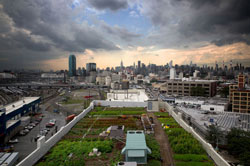
Top stories






More news



Marketing & Media
Capitec’s new jingle makes banking fees as easy as 1, 2, 3, 6, 10




Marketing & Media
#Cannes2025 awarding juries include 20 creatives from Africa
Danette Breitenbach 23 Apr 2025









Edelkoort was referring to our changing lifestyles in embracing more organic, natural food, wanting to know the source of everything and harking back to natural fabrics and décor inside our homes. Love her or think she's from another planet, Edelkoort was right once again. We are more aggressive as customers these days in wanting to know the source of our food - particularly in the light of product scandals such as the horsemeat one and fears over genetically modified foodstuffs. The global movement to eat like our caveman ancestors has also found its way onto restaurant menus and more natural products and fabrics inhabit our homes.
Land needs the world over and urbanisation are leading to pressure on farmers globally, reducing land available for farming animals and growing food, and technology is making large scale farming as a career, a short term prospect, hence the inclusion of farming as an endangered career, in the Wall Street Journal's list of jobs that will cease to exist at some point (source: Career Cast) in the United States, and most likely in many other parts of the world:
1. Mail carrier - instead of 'snail mail', consumers are keeping in touch via social media and other mobile apps.
2. Farmer - technology again, allowing those in farming to accomplish more with fewer resources, particularly when it comes to hiring farmworkers.
3. Meter reader - advances in technology have eroded demand for people on the ground.
4. Newspaper reporter - indeed, any career involving paper is on the decline, including printers and lumberjacks.
5. Travel agent - goes without saying that people are booking their own travel online.
6. Lumberjack - same reason for a decline in newspaper reporters: online media proliferation.
7. Flight Attendant - cutbacks and mergers in the industry.
8. Drill-press operator - technological advances mean less opportunities.
9. Printing worker - again, anything to do with paper.
10. Tax examiner and collector - automated tax audits systems are making them redundant.
And of course, for those of you who want to read further, here are the top jobs to go for in the future, says Career Cast. These include mathematicians; university professors; statisticians; software engineers; computer systems analysts, etc.

So has farming, 'bought the farm' entirely? No, but it will change and more cities will set aside urban spaces for growing food. Popupcity.net listed urban farming as a top trend last year. According to Popupcity, urban farming shops are popping up all over in big cities, allowing city dwellers to start their own backyard 'farms' by providing advice, equipment and seed.
The question is how city farming will extend from "a 'vacant-lots-only' phenomenon to a 'rest-of-the-city' phenomenon" allowing the majority of the urban populace to share in the bounty. In London, Popupcity reports that Farm:shop is a workspace, café and meeting place with a real 'farm in a shop'. The Rotterdam Uit je eigen stad project has a business model with a marketing manager for the large-scale urban farm on a derelict lot, complete with restaurant and shop.
It all apparently started in Detroit in the US, which now boasts what is apparently the largest urban farm in the world: The Earthworks Urban Farm and has now even spread to empty office buildings and urban rooftops, such as Tokyo's basement farm Pasona 02 and New York's Brooklyn Grange rooftop farm, one of the largest in the world, providing organically produced vegetables to the community from two acres of rooftop, including chickens for eggs and bees for honey.
Here at home in Cape Town, the Oranjezicht City Farm (OZCF) is a non-profit project in the heart of the city, celebrating local food, culture, and community through urban farming, reclaiming vacant derelict land for the urban community. And recently The New Age reported that Johannesburg academics have embarked on a programme entitled Izindaba Zokudla (Conversations about Food) to support and engage with urban farmers to create "innovation in the food system" in Soweto.
There is no doubt that urban farming is becoming a very important global moment, as GOOD magazine reports with a wonderful account of how a family planted food instead of grass at their suburban home:
• It enables local commerce.
• Frees us from dependence on industrial farming and therefore oil.
• Renews focus on communities.
• Brings about a revolution in health and nutrition.
Urban farming is arguably the most important movement of all says GOOD, as we become more urbanised, as local farming is the answer to a host of issues such as climate change, the current health crisis, the recession and disparate food economy. It remains to be seen how marketers and brands ingratiate their way into this value chain with support for such worthy initiatives.
As long as we don't have to include 'pigeon pie' and 'rat ratatouille' on our urban menus, as a group of Pecha Kucha students envisaged in their Design Indaba presentation on urbanisation solutions a couple of years ago!

TRENDAFRiCA is a trend watching portal on consumer insight, research and trends from South Africa and further afield on the continent of Africa. It includes DAiLY trends headlines from around the world, influential Trendspotter columnists and in-depth reports on industry segments. Louise Marsland is the founder and editor.
Go to: www.trendafrica.co.za